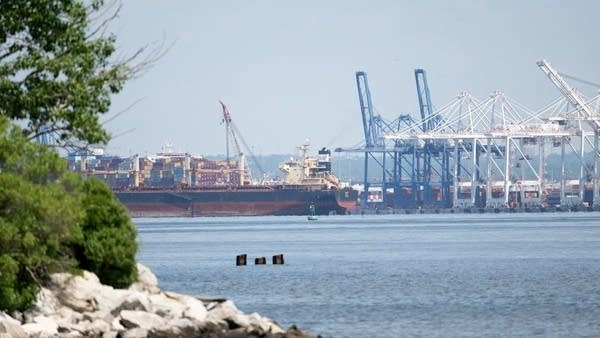Port of Baltimore reopens, but shipping business still feels “touchy”

When the Port of Baltimore fully reopened, it was a good day for Sue Monaghan, president and CEO of Baltimore International Warehousing and Transportation.
“It was just a very happy experience,” said Monaghan. “Feeling like you’re home again.”
The port was closed for 11 weeks following the collapse of the Francis Scott Key Bridge, which completely upended Baltimore’s drayage and storage industry, including Monaghan’s company. At one point, she made the decision to lay off most of her truck drivers, but a worker retention grant from the state allowed her to hire them back.
In addition, a lot of shipping traffic was rerouted to other ports on the Eastern Seaboard. Monaghan’s drivers started making regular trips to Norfolk, Virginia, and Philadelphia, but the long trips proved to be a burden — especially to Norfolk.
“A lot of [the drivers] have to get up very early in the morning, at 12 or one o’clock in the morning,” Monaghan said. “It’s difficult to get down to Norfolk and back, especially with all the traffic.”
“Marketplace” host Amy Scott spoke with Monaghan about how things are going now, and when she might see the port return to normal business volume. The following is a transcript of their conversation.
Amy Scott: So last time we talked, the port was still closed. You were finding ways to keep working, but how are things now?
Sue Monaghan: Well, the port is reopened. We haven’t seen the level of container movement yet. We are still picking up cargo out of Norfolk and Philadelphia, and Baltimore now.
Scott: So, you had expected it would take a while before your customers started booking cargo space into Baltimore. Are you starting to see those shipments come back?
Monaghan: Yes, we’re starting to see them come back. But customers who have booked cargo to Norfolk, and to Philadelphia, have not been able to divert all of that to Baltimore. So still coming into those ports.
Scott: And so your drivers are still driving long days to and from Norfolk and Philadelphia?
Monaghan: Yes. Yes, they are.
Scott: What’s that been like for them? These are folks who were used to working locally, right?
Monaghan: Some of the drivers don’t mind driving, having a long day. And just making one move. In Baltimore, you can make three or four moves a day. Out of Norfolk, you’re making one move. So some of them don’t want to go and we’ve had drivers that said, “no, I’m not going.” A lot of them have to get up very early in the morning, twelve, one o’clock in the morning, it’s difficult to get down to Norfolk and back, especially with all the traffic. You don’t have Francis Scott Key Bridge open, so everybody’s coming through the tunnels. The drivers can get stuck during rush hour traffic. We don’t have a terminal in Norfolk, so they have to go down and come back in the same night.
Scott: When I visited you back in April, your daughter was there, learning the ropes, planning to take over the business one day. Is she still wanting to do that after what your business has been through the past couple of months?
Monaghan: Yes. She’s been an instrumental part of moving this cargo, of keeping track of the drivers and the drivers’ time and making the arrangements. I think it’s kind of a daunting task, when you have to book appointments in different ports and make sure the drivers are going to meet those times, because if they don’t, then they have to wait three, four or five hours. And then they have to spend the night, which is just added expense and then they’re out of rotation. She’ll say to me, “you know, I’ve got everything scheduled if it all goes perfectly, and somebody doesn’t call out or blow a tire.” So, it’s interesting. She’s doing a great job with it and she’s still committed.
Scott: What are you hearing from your customers, folks that had depended on the Port of Baltimore and had to pivot? Are they excited to be shipping to Baltimore again?
Monaghan: Yes, I just had one customer email me: “We’re finally coming back to Baltimore.” They had moved everything to Charleston. But it makes more sense for them to be in Baltimore, so they’re excited to come back to Baltimore.
Scott: When the port first reopened, can you tell me what it felt like to send a driver to pick up that first container?
Monaghan: Just a very happy experience. We did have freight coming into Baltimore throughout. Some of the steamship lines railed into Baltimore. So, we had a couple of things happening. But then it just opened up recently and — yes, [a] very good feeling. Feeling like you’re home again.
Scott: I mean, were you guys like popping champagne?
Monaghan: Not yet. Not yet. We feel like this is a little an in-between stage here while you’re still trying to operate out of Norfolk and Baltimore and Philly. It’s still a little bit daunting for us. We don’t want the customers to have to suffer if we can’t handle all of that cargo at one time, so it’s just a little touchy right now.













